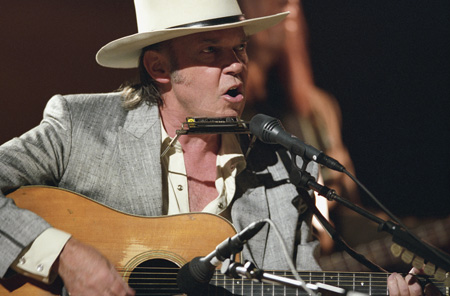Neil Young: Heart of Gold
 Young, a child of Canada (born in Toronto, moved to Los Angeles in 1966), is followed closely in this film, but not in the conventional manner. Instead of featuring long stretches of interviews about his childhood, his aspirations, the road to fame, etc. the film tightens its focus on one performance at the Ryamn Auditorium in Nashville. This is an …
Young, a child of Canada (born in Toronto, moved to Los Angeles in 1966), is followed closely in this film, but not in the conventional manner. Instead of featuring long stretches of interviews about his childhood, his aspirations, the road to fame, etc. the film tightens its focus on one performance at the Ryamn Auditorium in Nashville. This is an …

Allow me to preface my review by saying that I’m not particularly a fan of Neil Young. I went in expecting this to be a conventional documentary, but was surprised to see a theatrical release of what’s essentially a concert.
Young, a child of Canada (born in Toronto, moved to Los Angeles in 1966), is followed closely in this film, but not in the conventional manner. Instead of featuring long stretches of interviews about his childhood, his aspirations, the road to fame, etc. the film tightens its focus on a live performance filmed over two nights at the Ryman Auditorium in Nashville. This is an optimal setting as, we are informed, the acoustics present an excellent recording opportunity.
Along with Young are some old-time regulars like Ben Keith, a steel guitarist, Grant Boatwright on guitar and vocals, Spooner Oldham on keyboards, and Rick Rosas. If ever there were a character who looked, felt and evoked the very image of a bass player, Rosas is it. Also featured are Emmylou Harris on backing and joint vocals, and Karl Himmel on percussion/drums.
Some biography comes through in between the musical performances, but as part of the usual on-stage anecdotes one comes to expect from a stage performance. We do, however, learn that Young had a brain aneurysm just prior to recording the album “Prairie Wind.” Learning this certainly gains one’s respect of the magnitude of Young’s achievement and the sincerity behind it.
He tells us of his father, who passed away a couple of years ago. His father was suffering from dementia. This was the inspiration, he says, behind the title track. Young observes with a note of humor, “It’s something to see your loved ones living in the moment.”
The set begins with “The Painter,” with a shuffle-beat, acoustic guitars and unsteady, lilting vocals that are rather characteristic of most of the tunes on his new album. As the curtains go up on the show, we first see the stage from the audience’s point of view. The camera returns here periodically, and most effectively in large ensemble pieces like “This Old Guitar” which is a tribute to the guitar he’s owned for the past thirty years — originally belonging to Hank Williams. Featured there are a dozen or so guitarists, including Young, picking and strumming away a wonderfully-harmonized rhythm.
While his lyrics aren’t complicated (“my overcoat is worn/the pockets are all torn”), both the words and the delivery reflect years of pain and anguish, particularly in seeing time pass, friends come and go. Unlike a lot of concert videos with their repetitiously-sweeping tracking shots, the stage cinematography in “Heart of Gold” involves more static setups with either racked or deep focus, depending on the mood of the piece at the moment.
The sound mix is perhaps the greatest element of this production. It matches very closely the tonality, depth and saturation of a 3000-seat auditorium like Minneapolis’ Historic State Theater, where I’ve immensely enjoyed performances from artists as divergent as Chris Isaak and Ravi Shankar. The audience is, as is now customary for surround mixes, channeled to the surrounds, placing the movie theater audience right in the crowd. While there’s a great deal of acoustic resonance captured, it never sounds too muddy, but also doesn’t bear the clean, processed sound of the studio recordings on “Prairie Wind.”
There isn’t much else to say because the film doesn’t have a narrative other than the story Young tells through his performance. And I think that’s the only way to understand an artist like him, through his work. It wouldn’t serve us well to know him by any other means. What’s reflected in “Heart of Gold,” as I mentioned before, behind the only so-so songwriting and singing talent of Young, is a degree of sincerity that exceeds his abilities — nevermind the hurdle of singing after an aneurysm.
I have often felt that people who feel a need to express themselves musically should never be put off by anything… be it old age, the learning curve of an instrument, or the reactions of purists who continually reject emerging technologies which allegedly remove the human skill behind the artistry.
Why should a quivering, at times off-key, voice like Young’s be silenced if it has something so visceral to express? Aren’t the characteristics of his voice part of the story he’s telling?
 Neil Young: Heart of Gold • Dolby® Digital surround sound in select theatres • Running Time: 103 minutes • MPAA Rating: PG for some drug-related lyrics. • Distributed by Paramount Classics
Neil Young: Heart of Gold • Dolby® Digital surround sound in select theatres • Running Time: 103 minutes • MPAA Rating: PG for some drug-related lyrics. • Distributed by Paramount Classics